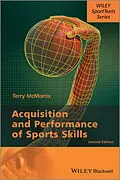An extensive update of a successful textbook on skill acquisition for sport students. Praised for its clarity of writing style and presentation the new edition will be an essential buy for those needing a practical, sport-focused introduction to the theory and application of human motor skills.
Autorentext
Terry McMorris University of Chichester, UK
Klappentext
Acquisition and Performance of Sports Skills
Second Edition
Praised for its clarity and sport focus, this new edition of Acquisition and Performance of Sports Skills, provides students with the theoretical and practical background that is necessary for an understanding of the basics of skill acquisition and performance. To reect the debate among researchers into psychomotor learning the ecological versus the cognitive approach the author includes examples from both schools of thought, thus ensuring a balanced approach.
As well as a major update of the text, examples and recommended reading, the new edition includes problem-solving tasks and, in each chapter, a report and brief critique of a relevant research paper. An accompanying website contains all the gures from the book together with a PowerPoint presentation of the key elements of each topic.
- A new edition of an established textbook, that looks at skill acquisition rmly within the context of sports performance.
- Clearly written, carefully structured and well illustrated with a colour plate section.
- Excellent pedagogy including learning objectives, problem-solving tasks and end of chapter questions.
- An accompanying website includes all the gures with annotations of the key elements of each topic and end of chapter experiments.
Written by an author with many years teaching, research and practical coaching experience, the new edition of this successful textbook will prove invaluable for students of sport and exercise science taking a rst course in skill acquisition, motor learning and/or motor control.
Inhalt
Preface xiii
Acknowledgements xix
About the Companion Website xxi
1 Skill, Ability and Performance 1
Learning objectives 1
Skill 2
Classification of skills 3
Ability 6
Genes 8
The ability-skill interaction 10
Summary 12
Theories of performance 12
Information processing theory 13
Ecological psychology theories 17
Conclusion 20
Summary 20
Skill 20
Ability 20
Ability-skill interaction 21
Information processing theory 21
Ecological psychology theories 22
Test your knowledge 22
Part one 22
Part two 24
Additional reading 24
2 Sensation and Perception of External Information 25
Learning objectives 25
Information processing theory, sensation and perception 26
Definition of Perception 27
Signal detection theory 28
Pattern recognition 30
Selective attention 33
Visual search 36
Quiet eye 37
Individual differences 37
Summary 39
Ecological psychology and perception 39
Criticisms of the ecological approach 43
Summary 43
Developmental factors 43
Vision 43
Audition 44
Perceptual development and the environment 44
Conclusion 44
Summary 45
Information processing theory and perception 45
Ecological psychology and perception 47
Developmental factors 47
Test your knowledge 48
Part one 48
Part two 50
Part three 51
Additional reading 51
3 Decision Making and Working Memory 53
Learning objectives 53
Decision making 54
Working memory and decision making 54
Dynamical systems theory and goal achievement 58
Child development 58
Piagetian theory 59
Mental space theory 60
Domain-specificity theories 60
Information processing theory and cognitive development 61
Ecological psychology theories of cognitive development 61
Summary 62
Ageing 65
Research findings and problems with research design 65
Conclusion 67
Summary 68
Information processing theory and decision making 68
Working memory and decision making 68
Functional brain regions and working memory 68
Dynamical systems theory and goal achievement 69
Developmental issues 69
Research 69
Test your knowledge 70
Part one 70
Part two 71
Part three 72
Additional reading 72
4 Reaction Time 73
Learning objectives 73
Reaction time, movement time and response time: definitions 74
Inter- and intraindividual differences 76
Hick-Hyman Law 77
Probability and choice reaction time 77
Psychological refractory period 78
Stimulus and response factors 79
Central executive tasks and reaction time 84
Arousal and reaction time 84
Development and reaction time 85
Ageing 85
Reaction time research findings as evidence for and against information processing theory 85
Summary 86
Test your knowledge 87
Part one 87
Part two 88
Part three 89
Additional reading 89
5 Anticipation 91
Learning objectives 91
Interceptive actions 92
Information processing theory and interceptive actions 92
Watching the object to be intercepted 93
Action systems theory and interceptive actions 94
Perceptual anticipation 95
Information processing theory and perceptual anticipation 95
Ecological psychology and perceptual anticipation 96
Development and anticipation 102
Summary 103
Information processing theory and interceptive actions 103
Action systems theory and interceptive actions 103
Watching the ball and interceptive actions 103
Information processing theory and perceptual anticipation 103
Ecological psychology and perceptual anticipation 103
Research paradigms in perceptual anticipation 104
Research results 104
Developmental factors 104
Test your knowledge 104
Part one 104
Part two 106
Part three 107
Additional reading 107
6 Motor Control 109
Learning objectives 109
Central nervous system-peripheral nervous system interaction 110
Types of feedback 113
Summary 119
Information processing theory and efferent organization 119
Motor programmes 120
Summary 123
Ecological psychology and motor control 123
Visual guidance of movement 125
Summary 126
Development and motor control 127
Neurological and physiological growth 127
Adolescence 128
Ageing 129
Theories of motor development 129
Ecological psychology and motor development 130
Motor performance 131
Ageing 132
Practical implications 132
Mini-games 133
Conditioned games 133
Gender issues 134
Physical stress during performance 134
Summary 135
Brain and motor control 135
Proprioception 135
Motor programmes 135
Ecological psychology and motor control 135
Developmental issues 136
Theories of motor development 136
Motor performance 136
Test your knowledge 137
Part one 137
Part two 138
Additional reading 139
7 Memory 141
Learning objectives 141
Information processing theory and short-term memory 142
Sensory information store 142
Short-term memory 142
Forgetting in short-term memory 143
Short-term motor memory 144
Information processing theory and long-t…
